人教版中考英语复习第二章第一节易混词的归纳总结和辨析课件(共115张PPT)
文档属性
| 名称 | 人教版中考英语复习第二章第一节易混词的归纳总结和辨析课件(共115张PPT) |

|
|
| 格式 | ppt | ||
| 文件大小 | 654.5KB | ||
| 资源类型 | 教案 | ||
| 版本资源 | 人教新目标(Go for it)版 | ||
| 科目 | 英语 | ||
| 更新时间 | 2024-02-05 10:36:11 | ||
图片预览


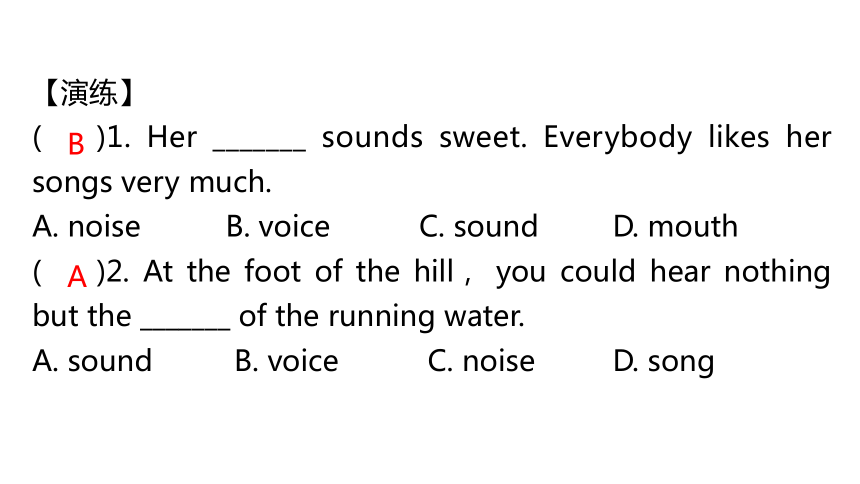
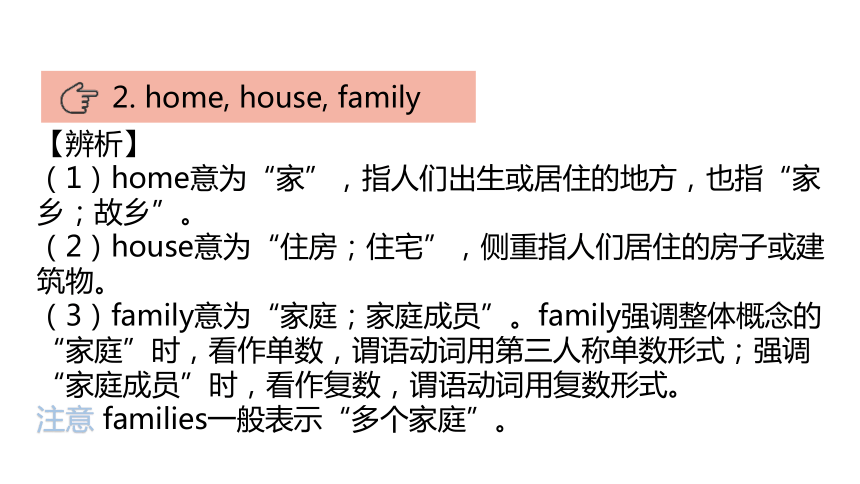
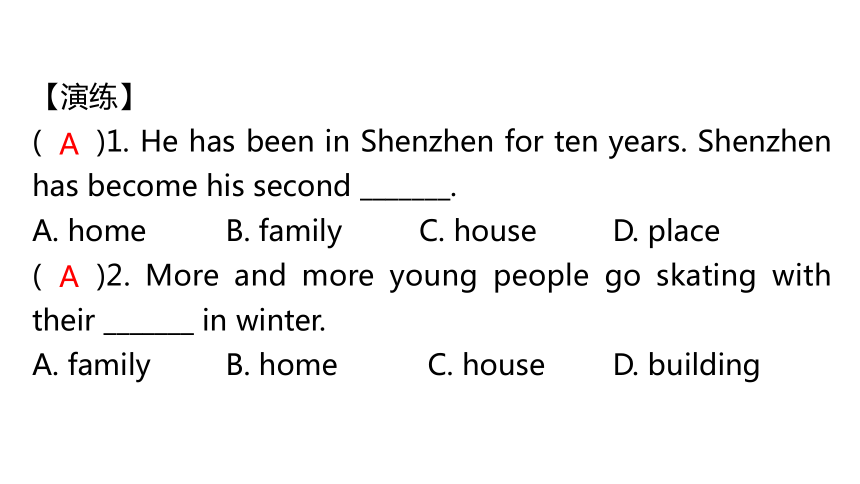
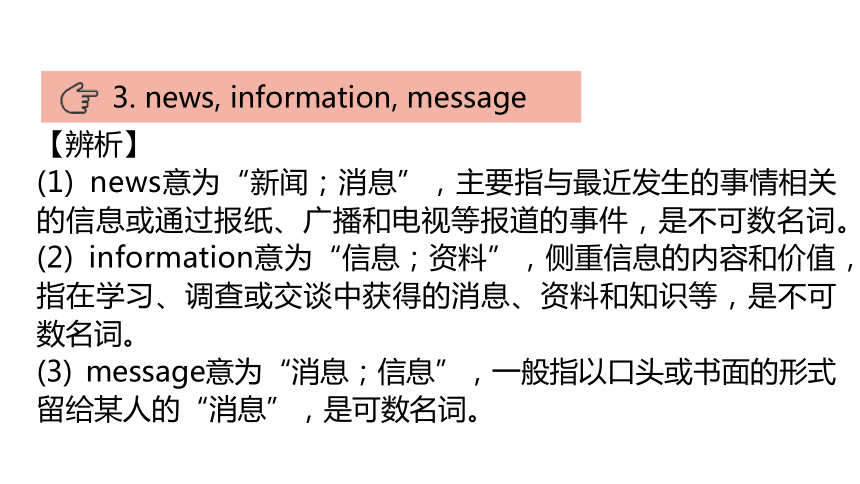
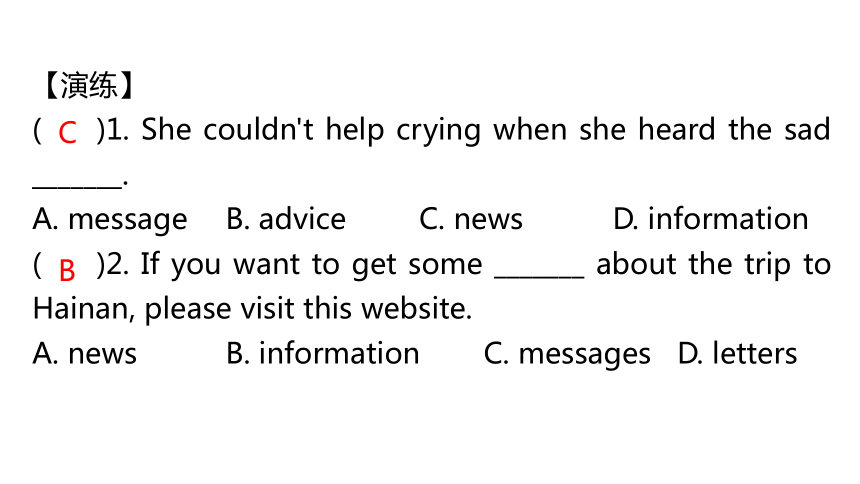


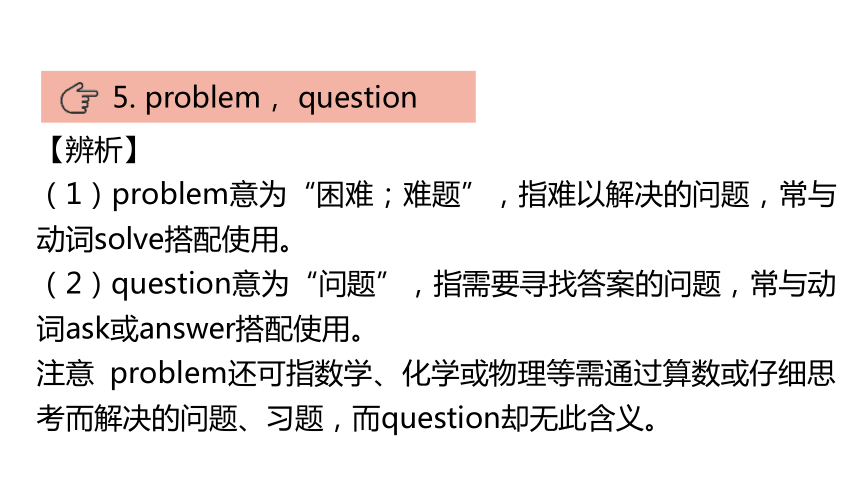
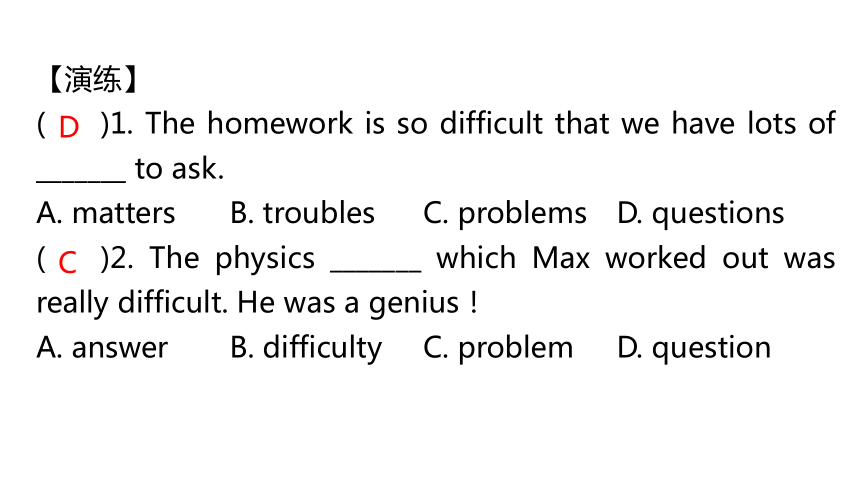
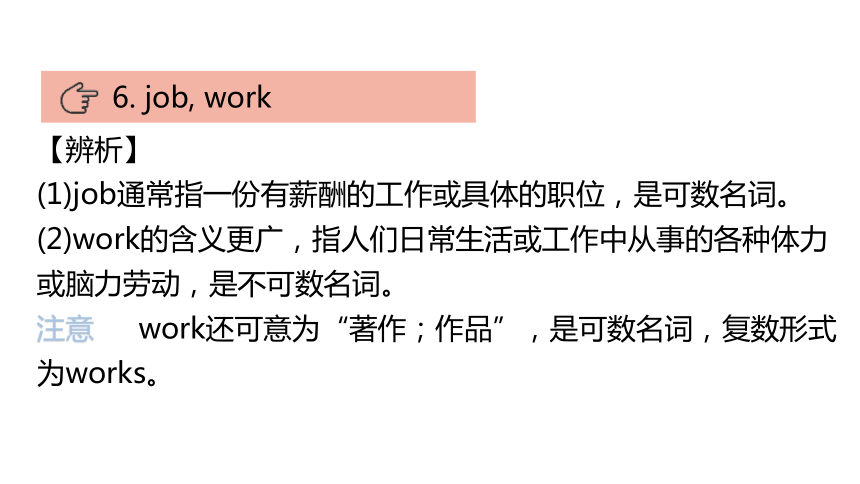
文档简介
(共115张PPT)
中考高频词汇突破
第一节 易混词的归纳总结和辨析
第二章 常见单词、短语的归纳和辨析
名词类辨析
1. noise, voice, sound
【辨析】
(1)noise意为“噪音;喧闹声”,常指不悦耳、不和谐的嘈杂声。
(2)voice意为“声音”,指人的嗓音或说话、唱歌时发出的声音。
(3)sound意为“声音;响声”,其使用范围较广,可指自然界各种各样的能被听到的声音。
【演练】
( )1. Her _______ sounds sweet. Everybody likes her songs very much.
A. noise B. voice C. sound D. mouth
( )2. At the foot of the hill, you could hear nothing but the _______ of the running water.
A. sound B. voice C. noise D. song
B
A
【辨析】
(1)home意为“家”,指人们出生或居住的地方,也指“家乡;故乡”。
(2)house意为“住房;住宅”,侧重指人们居住的房子或建筑物。
(3)family意为“家庭;家庭成员”。family强调整体概念的“家庭”时,看作单数,谓语动词用第三人称单数形式;强调“家庭成员”时,看作复数,谓语动词用复数形式。
注意 families一般表示“多个家庭”。
2. home, house, family
【演练】
( )1. He has been in Shenzhen for ten years. Shenzhen has become his second _______.
A. home B. family C. house D. place
( )2. More and more young people go skating with their _______ in winter.
A. family B. home C. house D. building
A
A
【辨析】
(1) news意为“新闻;消息”,主要指与最近发生的事情相关的信息或通过报纸、广播和电视等报道的事件,是不可数名词。
(2) information意为“信息;资料”,侧重信息的内容和价值,指在学习、调查或交谈中获得的消息、资料和知识等,是不可数名词。
(3) message意为“消息;信息”,一般指以口头或书面的形式留给某人的“消息”,是可数名词。
3. news, information, message
【演练】
( )1. She couldn't help crying when she heard the sad _______.
A. message B. advice C. news D. information
( )2. If you want to get some _______ about the trip to Hainan, please visit this website.
A. news B. information C. messages D. letters
C
B
【辨析】
(1)advice意为“建议;劝告”,指给出关于某人在特定情况下应该做什么的建议,侧重依据个人经验、学识和正确判断而提出的忠言,是不可数名词。常见搭配有:give some advice给出一些建议, ask for advice寻求建议。
(2)suggestion意为“建议;提议”,语气较婉转,侧重于提出供人参考的想法,是可数名词。
4. advice, suggestion
【演练】
( )1. I don't know what to do. Can you give me some _______?
A. words B. questions C. mistakes D. advice
( )2. Your _______ sound good. I will follow them.
A. suggestions B. introductions
C. messages D. advice
D
A
【辨析】
(1)problem意为“困难;难题”,指难以解决的问题,常与动词solve搭配使用。
(2)question意为“问题”,指需要寻找答案的问题,常与动词ask或answer搭配使用。
注意 problem还可指数学、化学或物理等需通过算数或仔细思考而解决的问题、习题,而question却无此含义。
5. problem, question
【演练】
( )1. The homework is so difficult that we have lots of _______ to ask.
A. matters B. troubles C. problems D. questions
( )2. The physics _______ which Max worked out was really difficult. He was a genius!
A. answer B. difficulty C. problem D. question
D
C
【辨析】
(1)job通常指一份有薪酬的工作或具体的职位,是可数名词。
(2)work的含义更广,指人们日常生活或工作中从事的各种体力或脑力劳动,是不可数名词。
注意 work还可意为“著作;作品”,是可数名词,复数形式为works。
6. job, work
【演练】
( )1. The room is in a mess. We have to do a lot of _______ to make it clean.
A. work B. jobs C. works D. study
( )2. He was a lucky dog because he got a good _______ after graduating from university.
A. task B. job C. work D. worker
A
B
动词类辨析
1. put on, wear, dress
【辨析】
(1)put on意为“穿上;戴上”,强调动作,后接物。
(2)wear意为“穿着;戴着”,表示状态,后接物。
(3)dress意为“给……穿衣服”,后接人。
【演练】
( )1. It's cold outside. _______ your coat when you go out.
A. Have on B. Wear C. Put on D. Take off
( )2. Do you believe the little boy can _______ himself every morning
A. put on B. put C. wear D. dress
C
D
【辨析】
(1)join常指加入某一组织、党派、社会团体并成为其中的一员,后面直接接名词或代词。
(2)join in常指加入某项正在进行的活动、游戏等,后面接名词或动名词。
(3)take part in常指参加群众性的活动,并在其中起到一定的积极作用。
(4)attend常指参加或出席正式的活动(会议、典礼等)。
2. join, join in, take part in, attend
【演练】用方框内所给单词或短语的适当形式填空,每词仅用一次
1. The school sports meeting is coming. I would like to _________________________ it.
2. She ____________ the Health Club last year.
join, attend, join in, take part in
take part in
joined
3. Everyone in the restaurant ____________ singing a birthday song for her yesterday.
4. Lucy got married last Saturday. I ____________ her wedding.
join, attend, join in, take part in
joined in
attended
【辨析】
(1)look意为“看;瞧”,指有目的地将目光转向某处,强调“看”的动作,后面常与at搭配使用,一般用于表示看静止的物体。
(2)see意为“看见”,表示视觉器官有意识或无意识地看到物体,强调“看”的结果。
?3. look, see, watch, notice, read
(3)watch意为“观看;注视”,用于表示看移动或变化的物体,如看电视、比赛等。
(4)notice意为“看到;听到;注意到”,含有从不注意到注意变化的意义。
(5)read意为“阅读;读懂”,指看文字,如书、报纸、杂志等。
【演练】用方框内所给单词的适当形式填空,每词仅用一次
look, see, watch, notice, read
1. I wonder how often you ____________ TV at home.
2. Did you ____________ that the man in black stood there for over two hours
3. It's a good habit to ____________ books every day.
4. I can ____________ a river throw my window.
5. She ____________ at me and smiled.
watch
notice
read
see
looked
【辨析】
(1) say意为“说”,强调说话的内容,不以人作直接宾语。
(2) talk意为“谈话;交谈”,强调说话者之间的交流。常见搭配有:talk with / to sb. 与某人交谈,talk about sth. 谈论某事。
4. say, talk, speak,tell
(3) speak作不及物动词时,意为“谈话;交谈”,比talk更正式,强调与某人交谈试图达到某一目的或让对方做某事,常见搭配为:speak to / with sb. (about sth.) (就某事)与某人交谈;作及物动词时,意为“讲(某种语言)”,后面接表示语言的名词。
(4) tell意为“告诉;讲述”,后面常接双宾语,即:tell sb.sth./ tell sth.to sb. 告诉某人某事。
【演练】
( )1. You should _______ goodbye to Mr.Wu before leaving the town tomorrow.
A. speak B. tell C. say D. talk
( )2. My uncle often _______ us funny stories when we were young.
A. said B. spoke C. told D. talked
C
C
( )3. This Friday afternoon, my teacher wants to _______ with my parents. I'm a little worried.
A. ask B. talk C. tell D. say
( )4. Ashley could _______ two languages—German and French.
A. speak B. talk C. say D. tell
B
A
【辨析】
四者都可以表示“花费”,但用法均有不同。
(1)spend的主语是人,通常表示花费时间或金钱,常见用法有:sb.spend(s) time / money on sth. 某人在……上花费时间 / 金钱,sb.spend(s) time / money doing sth. 某人花费时间 / 金钱做某事。
5. spend,cost, take, pay
(2)cost的主语是某物或某事,通常表示花费金钱,常见用法为:sth.cost(s)sb.money某物花了某人多少钱。
(3)take的主语是it或某事,通常表示花费时间,常见用法有:It takes sb.time to do sth. =doing sth.takes sb.time做某事花了某人多少时间。
(4)pay的主语是人,通常表示花费金钱,常与for搭配使用,常见搭配有:pay (sb.)money for sth.付钱(给某人)买某物,pay for sth.为某物付钱,pay for sb.替某人付钱。
【演练】
( )1. It _______ Mary about two days to finish this project.
A. paid B. took C. spent D. cost
( )2. He _______ much time on books. So he knows a lot about this subject.
A. pays B. takes C. costs D. spends
B
D
( )3. —How much is the ticket to Central Park?
—A one-way ticket _______ ¥40, and you can _______ another ¥20 for a round-trip ticket.
A. costs; pay B. costs; spend
C. pays; spend D. spends; pay
A
【辨析】
(1)take意为“拿走;带走”,指把某物或某人带到说话者和听者都不在的地方去。
(2)bring意为“拿来;带来”,指把某物或某人从别处带到说话者或听者所在的地方来。
(3)get意为“取来”,与fetch同义,表示到某处把某人请来或把某物取来(双程)。
(4)carry意为“搬运;携带”,不具体说明来去的方向,有时含有沉重或麻烦之意。
6. take, bring, get, carry
【演练】用方框内所给单词的适当形式填空,每词仅用一次
1. ____________ the photos when you come to visit me.
2. I'll ____________ the letter to her house.
3. Can you help me ____________ the box It's too heavy.
4. There is no water in the bottle. Why not go and ____________ some
take,bring,get,carry
Bring
take
carry
get
【辨析】
(1)borrow表示“借入”,是非延续性动词。borrow … from … 意为“向某人 /从某处借入某物”。
(2)lend表示“借出”,是非延续性动词。lend sth.to sb./lend sb.sth. 意为“借出某物给某人”。
(3)keep意为“保留;借”,是延续性动词。“keep sth.for+时间段”表示“借某物多长时间”。
7. borrow, lend, keep
【演练】
( )1. —Can I _______ your bike My bike is broken.
—Sorry. I can't _______ it to you because mine is broken, too.
A. borrow; borrow B. lend; lend
C. borrow; lend D. lend; borrow
( )2. Daisy _______ a book from her cousin and she has _______ it for three weeks.
A. borrowed; lent B. borrowed; kept
C. lent; kept D. kept; borrowed
C
B
【辨析】
(1)get表示“到达”时是不及物动词,要与介词to连用,即:get to+表示地点的名词。
(2)arrive是不及物动词,表示“到达某地”时要借助介词in或at,后接到达的城市、国家或地区时常用in,后接到达的具体地点或场所时常用at。
(3)reach表示“到达”时是及物动词,直接接地点,即:reach+表示地点的名词。
8. get, arrive, reach
注 意 当arrive和get后面接表示地点的副词(如here, there, home等)时,无须加介词;如果需要单独使用,后面不接任何地点名词或副词时,只能用arrive。
【演练】
( )1. Last night, Alice _______ New York and began her trip there.
A. got B. arrived at C. reached in D. arrived in
( )2. I wanted to know when you _______ the school library yesterday afternoon.
A. arrived B. got C. reached D. arrived in
( )3. I'll wait until they _______.
A. reach B. get C. arrive D. lose
D
C
C
【辨析】
(1)leave意为“忘了带;丢下”,常用于“leave sth./sb.+介词+名词”结构中,表示“将某物 / 某人落在某处”。
(2)forget意为“忘记带(需要之物)”,后面直接接名词,不再接地点。
(3)lose意为“丢失;失去”,表示找不到某物或某人。
9. leave, forget, lose
【演练】
( )1. I have _______ my schoolbag at home. I can't hand in my homework now.
A. lost B. forgotten C. left D. missed
( )2. On his way home, Jack _______ his wallet and he had to go back to look for it.
A. lost B. left C. sold D. forgot
( )3. I _______ my passport, so I had to go back and get it.
A. left B. forgot C. remembered D. found
C
A
B
【辨析】
(1)look for意为“寻找”,强调找的过程,结果未知。
(2)find意为“找到”,强调找的结果。
(3)find out意为“查出;查明”,表示经过调查后弄清真相。
10. look for, find, find out
【演练】
( )1. The police _______ the missing child in the mountain, but they couldn't _______ him.
A. found; look for B. found out; find
C. looked for; find D. looked for; find out
C
( )2. The man died accidentally yesterday. The police were trying to _______ the truth.
A. come out B. sell out
C. set out D. find out
D
【辨析】
(1)offer意为“给予”,强调主动提供,常见搭配有:offer sb.sth./offer sth.to sb.提供某人某物。
(2)provide意为“供给;提供”,强调提供生活必需品或他人想要的物品,常见搭配有:provide sb.with sth. / provide sth.for sb.为某人提供某物。
(3)supply意为“供应;提供”,强调长期并且量大的供应,常见搭配有:supply sb.with sth. / supply sth.to sb.向某人提供某物。
11. offer, provide, supply
【演练】
( )1. The government _______ enough food and drink for the people in the earthquake.
A. supplied B. offered C. provided D. gave
( )2. She _______ me 2 dollars so that I could have enough money to buy the book.
A. provided B. offered C. borrowed D. supplied
C
B
( )3. Our school _______the students with warm water in the dormitory every day.
A. supplies B. offers
C. sells D. buys
A
【辨析】
(1)accept意为“接受”,指主观上接受或同意,强调本人的意愿。
(2)receive意为“接到;收到”,指客观上收到某物,与本人意愿无关。
12. accept, receive
【演练】
( )1. He asked me to marry him and I _______.
A. got B. accepted C. received D. took
( )2. She _______ a bunch of roses, but she didn't know who sent it to her.
A. accepted B. left C. brought D. received
B
D
【辨析】
(1)happen意为“发生;碰巧”,泛指客观情况的发生,强调情况发生的偶然性,常见搭配有:happen to sb.发生在某人身上, happen to do sth.碰巧做某事。
(2)take place意为“发生,进行”,指事件或活动等经过计划或安排好的事情的发生。
13. happen, take place
注意 常与happen搭配的名词有accident, crash, earthquake, tsunami(海啸)等;常与take place搭配的名词有 sports meeting, party, celebration, festival, wedding, ceremony等。此外,happen和take place通常不用于被动语态。
【演练】用happen或take place的适当形式填空
1. A car accident ____________ to the old man last night.
2. The marriage ceremony will ____________ in the church.
happened
take place
【辨析】
两者作动词时都可表示“希望(某事发生)”。
(1)hope表示有较大可能性实现的希望,可用于“hope+that从句”和hope to do sth.结构中。
(2)wish则表示难以实现的愿望,后面通常接一个that引导的宾语从句,且从句里的动词要用过去时,表示虚拟。
注意 wish还可以表示“想要做某事”,可用于wish to do sth.和wish sb.to do sth.结构中。而hope则没有hope sb. to do sth. 这个用法。
14. hope, wish
【演练】
( )1. Sometimes he _______ he had never been born.
A. hopes B. wishes C. makes D. decides
( )2. Next Saturday will be my birthday. I _______ you can come a little earlier.
A. make B. get C. hope D. wish
B
C
【辨析】
(1)win意为“获得;赢”,后接比赛、赛跑、战争、奖品、金钱等。
(2)beat 意为“打败;胜过”,后接竞争的对手。
15. win, beat
【演练】
( )1. Last week, Li Hong _______ Chen Hao in the school table tennis match.
A. won B. lost C. had D. beat
( )2. He _______ first place in the shooting competition.
A. changed B. met C. won D. beat
D
C
介词类辨析
1. except, besides, but, except for
【辨析】
(1)except 意为“除……之外”,指在整体中除去一部分。
(2)besides意为“除……之外(还)”,指在整体中加入一部分。
(3)but意为“除……之外”,与except同义,但其前面通常有nobody, nothing, anything, no 等词出现。
(4)except for与except基本同义,但except主要用来谈论同类的东西,而except for后面接的词与前面所提的内容不同类,常表示整体中有不足,含有惋惜意味。
【演练】用方框内所给的单词或短语填空,每词仅用一次
1. ____________ working as a doctor, she also writes novels in her spare time.
2. We go to school every day ____________ Saturday and Sunday.
3. There is nothing new in the room ____________ a TV.
4. The bus was empty ____________ an old lady.
except, but, besides, except for
Besides
except
but
except for
【辨析】
(1)above表示“在……之上(不接触下面的物体,且为非正上方)”。
(2)over表示“在……的正上方(不接触下面的物体)”。
(3)on表示“在……上面(接触下面的物体)”。
(4)below表示“在……之下(不接触上面的物体,且为非正下方)”。
(5)under表示“在……的正下方(接触或没有接触上方的物体)”。
2. above, over, on, below, under
【演练】
( )1. We are flying _______ the clouds. The clouds are below us.
A. above B. over C. on D. in
( )2. There is a football _______ the chair. And the chair is over the football.
A. below B. under C. between D. above
A
B
【辨析】
(1)当after意为“在……(时间)之后”时,后接时间段或时间点;当它后面接一个时间段时,常用于过去时。
(2)当in意为“在…… (时间)之后”时,后接时间段,常用于将来时。
3. after, in
【演练】用after或in填空
1. All the students rush out of the classroom ____________
5:00 o'clock every afternoon.
2. He has gone to Beijing and will come back ____________ a few days.
after
in
【辨析】
(1)among一般用于三者或三者以上的人或事物,表示“在……之中”。
(2)between一般指两者之间,常与and连用,表示“在……之间”。
(3)in the middle of意为“在……中间”,可以表示在某个物体的中部,也可以表示在一个事件或一段时间的中间。
4. among, between, in the middle of
【演练】用among, between或in the middle of填空
1. Do you think his story is the most interesting ____________ the children's
2. ____________ the tall building and the park, there is a swimming pool.
3. What do you think of the boy sitting _________________ the classroom
among
Between
in the middle of
【辨析】
(1) across意为“横穿;穿过”,主要表示从物体的表面上穿过,如过马路、过桥等。
(2) through意为“穿过;通过;贯穿”,主要表示从物体的内部穿过,如穿过村庄、森林等。
注 意 go / walk across相当于cross。
5. across, through
【演练】用across或through填空
1. The door is too narrow for two people to go ____________ at the same time.
2. He walked ____________ a bridge to the city.
through
across
【辨析】
(1)like意为“相似;像”,表示某人或某物的“外表像……”或“某些特征像……”,而实际上不是。
(2)as意为“像,如同”时,常用于做比较;意为“作为;当作”时,用于说明某人的工作、身份、职责或某物的用途、外观等。
6. like, as
【演练】用like或as填空
1. ____________ a student, everyone should follow the school rules.
2. My doctor always talks to me ____________ a teacher talking to a child.
3. She'll soon be as tall ____________ her mother.
As
like
as
【辨析】
(1)since后接时间点,意为“自从……”。
(2)for后接时间段,表示持续一段时间。
7. since, for
【演练】
( )1. They've been in China _______ one and a half years.
A. in B. for C. since D. after
( )2. Harry has stayed here _______ last night. He has been here _______ 12 hours.
A. for; since B. for; from
C. since; for D. from; for
B
C
【辨析】
(1)in front of表示“在……(某空间外部)的前面”。
(2)in the front of表示“在……(某空间内部)的前面”。
8. in front of, in the front of
【演练】用in front of 或in the front of填空
1. There are some tall trees ____________ the building.
2. The teacher is having class _________________ the classroom.
in front of
in the front of
形容词、副词类辨析
1. alive, living, lively, live
【辨析】
(1)alive意为“活着的;在世的”,强调生与死的界限,可作表语、宾语补足语或后置定语。
(2)living意为“活着的”,强调“尚在人间”或“健在”,可作表语或前置定语。
(3)lively意为“活泼的;充满活力的”,可作表语、宾语补足语或前置定语。
(4)live作形容词时,可意为“活的”,相当于living; 也可意为“现场的;直播的”。
【演练】用方框内所给的单词填空,每词仅用一次
1. He has many ways to make his class ____________ and interesting.
2. It's the most wonderful ____________ football match that I have ever seen.
3. All the adults were killed in the accident, but the little boy was ____________.
4. He is probably one of the best-known ____________ writers.
alive, living, lively, live
lively
live
alive
living
【辨析】
(1)high意为“高的”,反义词为low,意为“低的”,用来形容价格、租金或收费的高低。
(2)expensive意为“昂贵的”,反义词为cheap,意为“便宜的”,用来形容物品本身。
2. high / low, expensive / cheap
【演练】
( )1. Though the price is _______, this kind of computer still sells well.
A. low B. cheap C. high D. expensive
( )2. The computer is so _______ that I can't afford it.
A. low B. high C. cheap D. expensive
C
D
【辨析】
(1)a few后面接复数名词,表肯定意义,意为 “一些;几个”。
(2)few后面接复数名词,表否定意义,意为“几乎没有”。
(3)a little后面接不可数名词,表肯定意义,意为“一点;一些”。另外,a little还可作副词,后面接形容词、副词原级和比较级,如:a little fat有点胖,a little faster更快一点。
(4)little后面接不可数名词,表否定意义,意为“几乎没有”。
3. a few, few, a little, little
【演练】
( )1. It is good for the fish to have _______ water plants in the tank to keep the water pure.
A. little B. a little C. few D. a few
( )2. The twins can speak _______ French. So they can't talk with you in French.
A. a fewB. fewC. littleD. a little
?
D
C
【辨析】
它们都可以表示“也”。
(1)either通常用于否定句中,意为“也不”,置于句末,可用逗号隔开,也可不用。
(2)too通常用于肯定句或一般疑问句中,置于句末,可用逗号隔开,也可不用,较口语化。
(3)also通常用于肯定句中,置于行为动词之前,情态动词、助动词或be动词之后,较正式。
(4)as well通常用于肯定句中,置于句末,通常不用逗号隔开,较口语化。
4. either, too, also, as well
【演练】
( )1. I haven't been to Korea. Coco hasn't,_______.
A. either B. too C. also D. as well
( )2. Jacky is a French teacher. Tom is _______ a French teacher.
A. too B. as well C. also D. either
A
C
【辨析】
(1)sometimes是副词,意为“有时”,表示频率,同义词组为at times。
(2)some times意为“几次”,此时time作可数名词,表示“次数;倍数”。
(3)sometime是副词,意为“某个时候”,可指过去或将来的某个时候。
(4)some time意为“一段时间”,常与for连用,此时time作不可数名词。
5. sometimes, some times, sometime,
some time
【演练】
( )1. I miss you a lot. Will you come to see me _______ next week
A. sometime B. some time C. sometimes D. some times
( )2. The box is _______ bigger than that one in the corner.
A. sometimes B. some times C. some time D. sometime
( )3. She said that she would stay there for _______.
A. some times B. sometimes C. sometime D. some time
A
B
D
【辨析】
(1)already意为“已经”,多置于肯定句的中间。already在疑问句中时,常表示吃惊、意外的语气,此时already常置于句末。
(2)yet意为“已经;还”,常置于否定句或疑问句的末尾。
(3)still意为“仍然;还”,可用于各种句式中,且一般只置于句中。
6. already, yet, still
【演练】
( )1. Have you met your uncle at the airport _______?
A. yet B. still C. almost D. either
( )2. He has _______ set out for Beihai and now he may arrive there.
A. sometimes B. yet C. still D. already
( )3. Mr.Lin is looking for Tony. Is he _______ in the classroom?
A. already B. still C. never D. yet
A
D
B
【辨析】
(1)sleepy意为“困乏的;昏昏欲睡的”,在句中可作定语或表语。
(2)asleep意为“睡着的”,在句中只能作表语或宾语补足语,不能作定语,强调“睡着了”的状态。反义词是awake,意为“醒着的”。常见搭配为:fall asleep入睡。
7. sleepy, asleep
【演练】
( )1. He goes to bed very late every day, so he often feels _______.
A. asleep B. awake C. sleepy D. relaxed
( )2. Be quiet, please. The baby is _______.
A. asleep B. sleepy C. awake D. excited
C
A
【辨析】
(1)each既可以作形容词,也可以作代词,指两者或两者以上的人或事物中的“每一个”,强调个体。作代词时,可与“of+复数名词”连用构成名词短语,谓语动词用单数形式;作形容词时,修饰单数可数名词,谓语动词用单数形式。
(2)every只可以作形容词,指整体中的“每一个”,强调整体情况,修饰单数可数名词,谓语动词用单数形式。
注意 almost,nearly,not等词后面不能用each,要用every。
8. each,every
【演练】用each或every填空
1. ____________ of us should obey the traffic rules.
2. Almost ____________ student in our class has a bike.
Each
every
【辨析】
(1)whole意为“全部的;整体的”,常用来修饰单数可数名词,常置于冠词 (a, an, the)、单数指示代词、物主代词或所有格之后。
(2)all意为“所有的;全部的”,常用来修饰不可数名词或复数可数名词,常置于定冠词(the)、指示代词、物主代词或所有格之前。
注意 time, day, month, year等表示时间的词均可以用whole或all来修饰,如:the whole time / all the time(在某段时间内)一直, the whole day / all day一整天。
9. whole, all
【演练】
( )1. Dear students, please put _______ back to the bookshelf after you finish reading them.
A. the whole books B. the all books
C. all the books D. whole the books
( )2. _______ was excited and had a big party to celebrate the winning.
A. The whole team B. Whole the team
C. The all team D. All the team
C
A
【辨析】
(1)alone作形容词时,意为“单独的”,强调客观上独自一人,只能作表语。此外,alone还可作副词,意为“单独;独自”,在句子中作状语。
(2)lonely作形容词,意为“孤独的;寂寞的;荒凉的”,含有较浓的感彩,可作定语和表语。
10. alone, lonely
【演练】
( )1. The old peasant (农民) lives in a(n) _______ village far away, and he often feels _______.
A. alone; lonely B. lonely; lonely
C. alone; alone D. lonely; alone
B
( )2. The _______ girl was afraid of staying _______ in the _______ house.
A. alone; lonely; lonely B. lonely; lonely; alone
C. alone; alone; lonely D. lonely; alone; lonely
D
【辨析】
(1)everyday意为“每天的;日常的”,是形容词,作定语,后接名词。
(2)every day意为“每天”,是一个表示频率的副词词组,在句子中作状语。
11. everyday, every day
【演练】用everyday或every day填空
1. Her ____________ task is to water all the flowers in her office.
2. She can't accompany (陪伴) her son ____________ because she is very busy.
everyday
every day
【辨析】
(1)good作形容词,意为“好的;愉快的”。
(2)well作副词,意为“很好地;充分地”。well也可用作形容词,意为“良好的;健康的”。
12. good, well
【演练】
( )1. The activity is going _______. You are a good organizer.
A. well B. good C. badly D. hard
( )2. Traveling provides _______ chances for us to meet people from other countries.
A. similar B. terrible C. good D. well
A
C
【辨析】
两者都可表示“别的;其他的”。
(1)other在句子中作定语,它通常修饰复数可数名词,且置于被修饰的名词之前。
(2)else用来修饰something, anything, nothing, nobody, anybody等复合不定代词或who, whose, what, when, where等特殊疑问词,且置于这些词之后。
13. other, else
【演练】
( )1. It sells milk, butter, cheese, eggs, and _______.
A. else things B. things else
C. things other D. other things
( )2. Besides the yellow toy car, what _______ do you need?
A. toys other B. else C. else toys D. other
D
B
【辨析】
(1)hard作形容词时,意为“困难的;艰苦的;硬的”;作副词时,意为“努力地;猛烈地”。
(2)hardly只能用作副词,意为“几乎不”,表示否定概念,置于实义动词之前,情态动词、助动词或be动词之后,不能与not或其他否定词连用。
14. hard, hardly
【演练】
( )1. It was raining _______. People could _______ go out.
A. hardly; hardly B. hard; hard
C. hard; hardly D. hardly; hard
( )2. It is _______ for him to pass the exam because he _______ reviews.
A. hard; hard B. hard; hardly
C. hardly; hardly D. hardly; hard
C
B
【辨析】
(1)以后缀-ing结尾的形容词可以用于说明事物或人物,表示事物或人物的性质或特征。如:an interesting man一个有趣的男人,an exciting movie 一部令人兴奋的电影。
(2)以后缀-ed结尾的形容词通常用于说明人,指人对事物的感受。如:an interested audience 一位兴致勃勃的观众,feel excited 感到兴奋的。
15. -ing形容词, -ed形容词
【演练】
( )1. The concert is so _______. We all feel _______.
A. bored; bored B. bored; boring
C. boring; boring D. boring; bored
( )2. It was such _______ news that everyone cheered up.
A. exciting B. excited
C. tired D. tiring
D
A
代词、连词类辨析
1. another, the other, other,
others, the others
【辨析】
(1)another指三个或三个以上的同类的人或物中的“另一个;又一个”,用来代替或修饰单数可数名词。
(2)the other可指两个中的“另一个”,常与one连用,构成“one … the other …”结构,意为“一个……另一个……”;the other还可表示“其余全部的”,作定语修饰复数可数名词。
(3)other泛指“另外的”,作定语,后接复数可数名词或不可数名词,不能单独使用。如果前面有the, some, my等限定词,也可以与单数可数名词连用。
(4)others相当于“other+复数可数名词”,泛指“另外的人或物”,常用于“some … others …”结构。
(5)the others相当于“the other+复数可数名词”,特指某一范围内的“其余全部的人或物”。
【演练】
( )1. I don't think the coat is good enough. Can you show me _______?
A. another B. other C. others D. the other
( )2. There are thirty books on the bookshelf. Five are mine,and _______ are my father's.
A. others B. the other C. the others D. other
A
C
( )3. He has two sons. One is in Shanghai,and _______ is in Beijing.
A. another B. the other C. others D. the others
( )4. Some students are cleaning the windows and _______ are sweeping the floor.
A. others B. another C. the others D. other
B
A
【辨析】
这五个词作代词指代可数名词时,与两者有关:both, either, neither;与三者或三者以上有关:all, none。它们都可以与of连用,后接复数名词或代词。
(1)both表示“两者都”,both或both of短语作主语时,谓语动词用复数形式。
(2)all表示“三者或三者以上都”,all或all of短语作主语时,谓语动词用复数形式。
2. both, all, either, neither, none
(3)either表示“两者中的任何一个”,作主语时,谓语动词用单数形式,但either of短语作主语时,动词用单数或复数均可。
(4)neither表示“两者都不”,作主语时,谓语动词用单数形式,但neither of短语作主语时,动词用单数或复数均可。
(5)none表示“三者或三者以上中没有一个”,none或none of短语作主语时,谓语动词用单数形式或复数形式皆可。
【演练】
( )1. We asked John and Henry some easy questions, but _______ could answer them.
A. none B. both C. either D. neither
( )2. —Which do you prefer, the red one or the blue one
—_______ is OK. I don't care.
A. Either B. Neither C. Both D. All
D
A
( )3. He has two uncles. _______ of them are doctors, and they're in the same hospital.
A. None B. Neither C. Both D. All
C
【辨析】
三者都可用作代词,指代前面提到的名词。
(1)it意为“它”,指代前面提到过的人或物。(指同一个人或物)
(2)one表示泛指,指前面提到过的那类人或物中的任何一个,用来代替单数可数名词,其复数形式为ones。(指同类中不同的人或物)
(3)that意为“那;那个”,既可以指代前面提到过的人或物,也可以指代同一类别中的“另外一个”,用来代替单数可数名词或不可数名词,其复数形式为those。(可以指同一个人或物,也可以指同类中不同的人或物,此时多用于比较级句子中)
3. it, one, that
【演练】用it, one或that填空
1. Hangzhou is a wonderful city. I'll show ____________ to you if you want.
2. The weather in London is different from ____________ in Beijing.
3. My pen is lost. I need to buy a new ____________.
it
that
one
【辨析】
(1)and意为“和;与;同;然后”,可以用来连接两个结构对等的成分,以表示并列关系,也可以起承上启下的作用。
(2)but意为“可是;但是;然而”,所连接的成分之间是转折关系。
(3)or意为“或,或者”,连接两个或两个以上选择的可能性。但是,在否定句中,or意为“也不”,表示并列关系。
(4)so意为“因此;所以”,所连接的句子之间通常是因果关系。
4. and, but, or, so
【演练】用适当的连词填空
1. My back was still painful, ____________ I went to see a doctor.
2. Shall we go out to the cinema ____________ stay at home
3. The police have worked for three hours, ____________ nobody takes a break.
4. He plays the guitar ____________ sings folk songs.
so
or
but
but
【辨析】
两者作连词时,都可以表示“当……时”,引导时间状语从句。
(1)when表示某一时间点或某一时间段发生的事情,when引导的从句描述的动作或事情可以与主句描述的事情同时发生,也可以是先后发生。从句可以用延续性动词,也可以用非延续性动词。
5. when,while
(2)while表示主句的行为在从句行为进行的过程中发生,因此while引导的从句要用延续性动词,且该动词常用进行时态。如果主句和从句的行为是同时进行的,那么主句的谓语动词也要用进行时。
【演练】用when或while填空
1. I was reading a newspaper ____________ my brother came into the room.
2. Lily was singing a song ____________ David was playing the guitar.
when
while
中考高频词汇突破
第一节 易混词的归纳总结和辨析
第二章 常见单词、短语的归纳和辨析
名词类辨析
1. noise, voice, sound
【辨析】
(1)noise意为“噪音;喧闹声”,常指不悦耳、不和谐的嘈杂声。
(2)voice意为“声音”,指人的嗓音或说话、唱歌时发出的声音。
(3)sound意为“声音;响声”,其使用范围较广,可指自然界各种各样的能被听到的声音。
【演练】
( )1. Her _______ sounds sweet. Everybody likes her songs very much.
A. noise B. voice C. sound D. mouth
( )2. At the foot of the hill, you could hear nothing but the _______ of the running water.
A. sound B. voice C. noise D. song
B
A
【辨析】
(1)home意为“家”,指人们出生或居住的地方,也指“家乡;故乡”。
(2)house意为“住房;住宅”,侧重指人们居住的房子或建筑物。
(3)family意为“家庭;家庭成员”。family强调整体概念的“家庭”时,看作单数,谓语动词用第三人称单数形式;强调“家庭成员”时,看作复数,谓语动词用复数形式。
注意 families一般表示“多个家庭”。
2. home, house, family
【演练】
( )1. He has been in Shenzhen for ten years. Shenzhen has become his second _______.
A. home B. family C. house D. place
( )2. More and more young people go skating with their _______ in winter.
A. family B. home C. house D. building
A
A
【辨析】
(1) news意为“新闻;消息”,主要指与最近发生的事情相关的信息或通过报纸、广播和电视等报道的事件,是不可数名词。
(2) information意为“信息;资料”,侧重信息的内容和价值,指在学习、调查或交谈中获得的消息、资料和知识等,是不可数名词。
(3) message意为“消息;信息”,一般指以口头或书面的形式留给某人的“消息”,是可数名词。
3. news, information, message
【演练】
( )1. She couldn't help crying when she heard the sad _______.
A. message B. advice C. news D. information
( )2. If you want to get some _______ about the trip to Hainan, please visit this website.
A. news B. information C. messages D. letters
C
B
【辨析】
(1)advice意为“建议;劝告”,指给出关于某人在特定情况下应该做什么的建议,侧重依据个人经验、学识和正确判断而提出的忠言,是不可数名词。常见搭配有:give some advice给出一些建议, ask for advice寻求建议。
(2)suggestion意为“建议;提议”,语气较婉转,侧重于提出供人参考的想法,是可数名词。
4. advice, suggestion
【演练】
( )1. I don't know what to do. Can you give me some _______?
A. words B. questions C. mistakes D. advice
( )2. Your _______ sound good. I will follow them.
A. suggestions B. introductions
C. messages D. advice
D
A
【辨析】
(1)problem意为“困难;难题”,指难以解决的问题,常与动词solve搭配使用。
(2)question意为“问题”,指需要寻找答案的问题,常与动词ask或answer搭配使用。
注意 problem还可指数学、化学或物理等需通过算数或仔细思考而解决的问题、习题,而question却无此含义。
5. problem, question
【演练】
( )1. The homework is so difficult that we have lots of _______ to ask.
A. matters B. troubles C. problems D. questions
( )2. The physics _______ which Max worked out was really difficult. He was a genius!
A. answer B. difficulty C. problem D. question
D
C
【辨析】
(1)job通常指一份有薪酬的工作或具体的职位,是可数名词。
(2)work的含义更广,指人们日常生活或工作中从事的各种体力或脑力劳动,是不可数名词。
注意 work还可意为“著作;作品”,是可数名词,复数形式为works。
6. job, work
【演练】
( )1. The room is in a mess. We have to do a lot of _______ to make it clean.
A. work B. jobs C. works D. study
( )2. He was a lucky dog because he got a good _______ after graduating from university.
A. task B. job C. work D. worker
A
B
动词类辨析
1. put on, wear, dress
【辨析】
(1)put on意为“穿上;戴上”,强调动作,后接物。
(2)wear意为“穿着;戴着”,表示状态,后接物。
(3)dress意为“给……穿衣服”,后接人。
【演练】
( )1. It's cold outside. _______ your coat when you go out.
A. Have on B. Wear C. Put on D. Take off
( )2. Do you believe the little boy can _______ himself every morning
A. put on B. put C. wear D. dress
C
D
【辨析】
(1)join常指加入某一组织、党派、社会团体并成为其中的一员,后面直接接名词或代词。
(2)join in常指加入某项正在进行的活动、游戏等,后面接名词或动名词。
(3)take part in常指参加群众性的活动,并在其中起到一定的积极作用。
(4)attend常指参加或出席正式的活动(会议、典礼等)。
2. join, join in, take part in, attend
【演练】用方框内所给单词或短语的适当形式填空,每词仅用一次
1. The school sports meeting is coming. I would like to _________________________ it.
2. She ____________ the Health Club last year.
join, attend, join in, take part in
take part in
joined
3. Everyone in the restaurant ____________ singing a birthday song for her yesterday.
4. Lucy got married last Saturday. I ____________ her wedding.
join, attend, join in, take part in
joined in
attended
【辨析】
(1)look意为“看;瞧”,指有目的地将目光转向某处,强调“看”的动作,后面常与at搭配使用,一般用于表示看静止的物体。
(2)see意为“看见”,表示视觉器官有意识或无意识地看到物体,强调“看”的结果。
?3. look, see, watch, notice, read
(3)watch意为“观看;注视”,用于表示看移动或变化的物体,如看电视、比赛等。
(4)notice意为“看到;听到;注意到”,含有从不注意到注意变化的意义。
(5)read意为“阅读;读懂”,指看文字,如书、报纸、杂志等。
【演练】用方框内所给单词的适当形式填空,每词仅用一次
look, see, watch, notice, read
1. I wonder how often you ____________ TV at home.
2. Did you ____________ that the man in black stood there for over two hours
3. It's a good habit to ____________ books every day.
4. I can ____________ a river throw my window.
5. She ____________ at me and smiled.
watch
notice
read
see
looked
【辨析】
(1) say意为“说”,强调说话的内容,不以人作直接宾语。
(2) talk意为“谈话;交谈”,强调说话者之间的交流。常见搭配有:talk with / to sb. 与某人交谈,talk about sth. 谈论某事。
4. say, talk, speak,tell
(3) speak作不及物动词时,意为“谈话;交谈”,比talk更正式,强调与某人交谈试图达到某一目的或让对方做某事,常见搭配为:speak to / with sb. (about sth.) (就某事)与某人交谈;作及物动词时,意为“讲(某种语言)”,后面接表示语言的名词。
(4) tell意为“告诉;讲述”,后面常接双宾语,即:tell sb.sth./ tell sth.to sb. 告诉某人某事。
【演练】
( )1. You should _______ goodbye to Mr.Wu before leaving the town tomorrow.
A. speak B. tell C. say D. talk
( )2. My uncle often _______ us funny stories when we were young.
A. said B. spoke C. told D. talked
C
C
( )3. This Friday afternoon, my teacher wants to _______ with my parents. I'm a little worried.
A. ask B. talk C. tell D. say
( )4. Ashley could _______ two languages—German and French.
A. speak B. talk C. say D. tell
B
A
【辨析】
四者都可以表示“花费”,但用法均有不同。
(1)spend的主语是人,通常表示花费时间或金钱,常见用法有:sb.spend(s) time / money on sth. 某人在……上花费时间 / 金钱,sb.spend(s) time / money doing sth. 某人花费时间 / 金钱做某事。
5. spend,cost, take, pay
(2)cost的主语是某物或某事,通常表示花费金钱,常见用法为:sth.cost(s)sb.money某物花了某人多少钱。
(3)take的主语是it或某事,通常表示花费时间,常见用法有:It takes sb.time to do sth. =doing sth.takes sb.time做某事花了某人多少时间。
(4)pay的主语是人,通常表示花费金钱,常与for搭配使用,常见搭配有:pay (sb.)money for sth.付钱(给某人)买某物,pay for sth.为某物付钱,pay for sb.替某人付钱。
【演练】
( )1. It _______ Mary about two days to finish this project.
A. paid B. took C. spent D. cost
( )2. He _______ much time on books. So he knows a lot about this subject.
A. pays B. takes C. costs D. spends
B
D
( )3. —How much is the ticket to Central Park?
—A one-way ticket _______ ¥40, and you can _______ another ¥20 for a round-trip ticket.
A. costs; pay B. costs; spend
C. pays; spend D. spends; pay
A
【辨析】
(1)take意为“拿走;带走”,指把某物或某人带到说话者和听者都不在的地方去。
(2)bring意为“拿来;带来”,指把某物或某人从别处带到说话者或听者所在的地方来。
(3)get意为“取来”,与fetch同义,表示到某处把某人请来或把某物取来(双程)。
(4)carry意为“搬运;携带”,不具体说明来去的方向,有时含有沉重或麻烦之意。
6. take, bring, get, carry
【演练】用方框内所给单词的适当形式填空,每词仅用一次
1. ____________ the photos when you come to visit me.
2. I'll ____________ the letter to her house.
3. Can you help me ____________ the box It's too heavy.
4. There is no water in the bottle. Why not go and ____________ some
take,bring,get,carry
Bring
take
carry
get
【辨析】
(1)borrow表示“借入”,是非延续性动词。borrow … from … 意为“向某人 /从某处借入某物”。
(2)lend表示“借出”,是非延续性动词。lend sth.to sb./lend sb.sth. 意为“借出某物给某人”。
(3)keep意为“保留;借”,是延续性动词。“keep sth.for+时间段”表示“借某物多长时间”。
7. borrow, lend, keep
【演练】
( )1. —Can I _______ your bike My bike is broken.
—Sorry. I can't _______ it to you because mine is broken, too.
A. borrow; borrow B. lend; lend
C. borrow; lend D. lend; borrow
( )2. Daisy _______ a book from her cousin and she has _______ it for three weeks.
A. borrowed; lent B. borrowed; kept
C. lent; kept D. kept; borrowed
C
B
【辨析】
(1)get表示“到达”时是不及物动词,要与介词to连用,即:get to+表示地点的名词。
(2)arrive是不及物动词,表示“到达某地”时要借助介词in或at,后接到达的城市、国家或地区时常用in,后接到达的具体地点或场所时常用at。
(3)reach表示“到达”时是及物动词,直接接地点,即:reach+表示地点的名词。
8. get, arrive, reach
注 意 当arrive和get后面接表示地点的副词(如here, there, home等)时,无须加介词;如果需要单独使用,后面不接任何地点名词或副词时,只能用arrive。
【演练】
( )1. Last night, Alice _______ New York and began her trip there.
A. got B. arrived at C. reached in D. arrived in
( )2. I wanted to know when you _______ the school library yesterday afternoon.
A. arrived B. got C. reached D. arrived in
( )3. I'll wait until they _______.
A. reach B. get C. arrive D. lose
D
C
C
【辨析】
(1)leave意为“忘了带;丢下”,常用于“leave sth./sb.+介词+名词”结构中,表示“将某物 / 某人落在某处”。
(2)forget意为“忘记带(需要之物)”,后面直接接名词,不再接地点。
(3)lose意为“丢失;失去”,表示找不到某物或某人。
9. leave, forget, lose
【演练】
( )1. I have _______ my schoolbag at home. I can't hand in my homework now.
A. lost B. forgotten C. left D. missed
( )2. On his way home, Jack _______ his wallet and he had to go back to look for it.
A. lost B. left C. sold D. forgot
( )3. I _______ my passport, so I had to go back and get it.
A. left B. forgot C. remembered D. found
C
A
B
【辨析】
(1)look for意为“寻找”,强调找的过程,结果未知。
(2)find意为“找到”,强调找的结果。
(3)find out意为“查出;查明”,表示经过调查后弄清真相。
10. look for, find, find out
【演练】
( )1. The police _______ the missing child in the mountain, but they couldn't _______ him.
A. found; look for B. found out; find
C. looked for; find D. looked for; find out
C
( )2. The man died accidentally yesterday. The police were trying to _______ the truth.
A. come out B. sell out
C. set out D. find out
D
【辨析】
(1)offer意为“给予”,强调主动提供,常见搭配有:offer sb.sth./offer sth.to sb.提供某人某物。
(2)provide意为“供给;提供”,强调提供生活必需品或他人想要的物品,常见搭配有:provide sb.with sth. / provide sth.for sb.为某人提供某物。
(3)supply意为“供应;提供”,强调长期并且量大的供应,常见搭配有:supply sb.with sth. / supply sth.to sb.向某人提供某物。
11. offer, provide, supply
【演练】
( )1. The government _______ enough food and drink for the people in the earthquake.
A. supplied B. offered C. provided D. gave
( )2. She _______ me 2 dollars so that I could have enough money to buy the book.
A. provided B. offered C. borrowed D. supplied
C
B
( )3. Our school _______the students with warm water in the dormitory every day.
A. supplies B. offers
C. sells D. buys
A
【辨析】
(1)accept意为“接受”,指主观上接受或同意,强调本人的意愿。
(2)receive意为“接到;收到”,指客观上收到某物,与本人意愿无关。
12. accept, receive
【演练】
( )1. He asked me to marry him and I _______.
A. got B. accepted C. received D. took
( )2. She _______ a bunch of roses, but she didn't know who sent it to her.
A. accepted B. left C. brought D. received
B
D
【辨析】
(1)happen意为“发生;碰巧”,泛指客观情况的发生,强调情况发生的偶然性,常见搭配有:happen to sb.发生在某人身上, happen to do sth.碰巧做某事。
(2)take place意为“发生,进行”,指事件或活动等经过计划或安排好的事情的发生。
13. happen, take place
注意 常与happen搭配的名词有accident, crash, earthquake, tsunami(海啸)等;常与take place搭配的名词有 sports meeting, party, celebration, festival, wedding, ceremony等。此外,happen和take place通常不用于被动语态。
【演练】用happen或take place的适当形式填空
1. A car accident ____________ to the old man last night.
2. The marriage ceremony will ____________ in the church.
happened
take place
【辨析】
两者作动词时都可表示“希望(某事发生)”。
(1)hope表示有较大可能性实现的希望,可用于“hope+that从句”和hope to do sth.结构中。
(2)wish则表示难以实现的愿望,后面通常接一个that引导的宾语从句,且从句里的动词要用过去时,表示虚拟。
注意 wish还可以表示“想要做某事”,可用于wish to do sth.和wish sb.to do sth.结构中。而hope则没有hope sb. to do sth. 这个用法。
14. hope, wish
【演练】
( )1. Sometimes he _______ he had never been born.
A. hopes B. wishes C. makes D. decides
( )2. Next Saturday will be my birthday. I _______ you can come a little earlier.
A. make B. get C. hope D. wish
B
C
【辨析】
(1)win意为“获得;赢”,后接比赛、赛跑、战争、奖品、金钱等。
(2)beat 意为“打败;胜过”,后接竞争的对手。
15. win, beat
【演练】
( )1. Last week, Li Hong _______ Chen Hao in the school table tennis match.
A. won B. lost C. had D. beat
( )2. He _______ first place in the shooting competition.
A. changed B. met C. won D. beat
D
C
介词类辨析
1. except, besides, but, except for
【辨析】
(1)except 意为“除……之外”,指在整体中除去一部分。
(2)besides意为“除……之外(还)”,指在整体中加入一部分。
(3)but意为“除……之外”,与except同义,但其前面通常有nobody, nothing, anything, no 等词出现。
(4)except for与except基本同义,但except主要用来谈论同类的东西,而except for后面接的词与前面所提的内容不同类,常表示整体中有不足,含有惋惜意味。
【演练】用方框内所给的单词或短语填空,每词仅用一次
1. ____________ working as a doctor, she also writes novels in her spare time.
2. We go to school every day ____________ Saturday and Sunday.
3. There is nothing new in the room ____________ a TV.
4. The bus was empty ____________ an old lady.
except, but, besides, except for
Besides
except
but
except for
【辨析】
(1)above表示“在……之上(不接触下面的物体,且为非正上方)”。
(2)over表示“在……的正上方(不接触下面的物体)”。
(3)on表示“在……上面(接触下面的物体)”。
(4)below表示“在……之下(不接触上面的物体,且为非正下方)”。
(5)under表示“在……的正下方(接触或没有接触上方的物体)”。
2. above, over, on, below, under
【演练】
( )1. We are flying _______ the clouds. The clouds are below us.
A. above B. over C. on D. in
( )2. There is a football _______ the chair. And the chair is over the football.
A. below B. under C. between D. above
A
B
【辨析】
(1)当after意为“在……(时间)之后”时,后接时间段或时间点;当它后面接一个时间段时,常用于过去时。
(2)当in意为“在…… (时间)之后”时,后接时间段,常用于将来时。
3. after, in
【演练】用after或in填空
1. All the students rush out of the classroom ____________
5:00 o'clock every afternoon.
2. He has gone to Beijing and will come back ____________ a few days.
after
in
【辨析】
(1)among一般用于三者或三者以上的人或事物,表示“在……之中”。
(2)between一般指两者之间,常与and连用,表示“在……之间”。
(3)in the middle of意为“在……中间”,可以表示在某个物体的中部,也可以表示在一个事件或一段时间的中间。
4. among, between, in the middle of
【演练】用among, between或in the middle of填空
1. Do you think his story is the most interesting ____________ the children's
2. ____________ the tall building and the park, there is a swimming pool.
3. What do you think of the boy sitting _________________ the classroom
among
Between
in the middle of
【辨析】
(1) across意为“横穿;穿过”,主要表示从物体的表面上穿过,如过马路、过桥等。
(2) through意为“穿过;通过;贯穿”,主要表示从物体的内部穿过,如穿过村庄、森林等。
注 意 go / walk across相当于cross。
5. across, through
【演练】用across或through填空
1. The door is too narrow for two people to go ____________ at the same time.
2. He walked ____________ a bridge to the city.
through
across
【辨析】
(1)like意为“相似;像”,表示某人或某物的“外表像……”或“某些特征像……”,而实际上不是。
(2)as意为“像,如同”时,常用于做比较;意为“作为;当作”时,用于说明某人的工作、身份、职责或某物的用途、外观等。
6. like, as
【演练】用like或as填空
1. ____________ a student, everyone should follow the school rules.
2. My doctor always talks to me ____________ a teacher talking to a child.
3. She'll soon be as tall ____________ her mother.
As
like
as
【辨析】
(1)since后接时间点,意为“自从……”。
(2)for后接时间段,表示持续一段时间。
7. since, for
【演练】
( )1. They've been in China _______ one and a half years.
A. in B. for C. since D. after
( )2. Harry has stayed here _______ last night. He has been here _______ 12 hours.
A. for; since B. for; from
C. since; for D. from; for
B
C
【辨析】
(1)in front of表示“在……(某空间外部)的前面”。
(2)in the front of表示“在……(某空间内部)的前面”。
8. in front of, in the front of
【演练】用in front of 或in the front of填空
1. There are some tall trees ____________ the building.
2. The teacher is having class _________________ the classroom.
in front of
in the front of
形容词、副词类辨析
1. alive, living, lively, live
【辨析】
(1)alive意为“活着的;在世的”,强调生与死的界限,可作表语、宾语补足语或后置定语。
(2)living意为“活着的”,强调“尚在人间”或“健在”,可作表语或前置定语。
(3)lively意为“活泼的;充满活力的”,可作表语、宾语补足语或前置定语。
(4)live作形容词时,可意为“活的”,相当于living; 也可意为“现场的;直播的”。
【演练】用方框内所给的单词填空,每词仅用一次
1. He has many ways to make his class ____________ and interesting.
2. It's the most wonderful ____________ football match that I have ever seen.
3. All the adults were killed in the accident, but the little boy was ____________.
4. He is probably one of the best-known ____________ writers.
alive, living, lively, live
lively
live
alive
living
【辨析】
(1)high意为“高的”,反义词为low,意为“低的”,用来形容价格、租金或收费的高低。
(2)expensive意为“昂贵的”,反义词为cheap,意为“便宜的”,用来形容物品本身。
2. high / low, expensive / cheap
【演练】
( )1. Though the price is _______, this kind of computer still sells well.
A. low B. cheap C. high D. expensive
( )2. The computer is so _______ that I can't afford it.
A. low B. high C. cheap D. expensive
C
D
【辨析】
(1)a few后面接复数名词,表肯定意义,意为 “一些;几个”。
(2)few后面接复数名词,表否定意义,意为“几乎没有”。
(3)a little后面接不可数名词,表肯定意义,意为“一点;一些”。另外,a little还可作副词,后面接形容词、副词原级和比较级,如:a little fat有点胖,a little faster更快一点。
(4)little后面接不可数名词,表否定意义,意为“几乎没有”。
3. a few, few, a little, little
【演练】
( )1. It is good for the fish to have _______ water plants in the tank to keep the water pure.
A. little B. a little C. few D. a few
( )2. The twins can speak _______ French. So they can't talk with you in French.
A. a fewB. fewC. littleD. a little
?
D
C
【辨析】
它们都可以表示“也”。
(1)either通常用于否定句中,意为“也不”,置于句末,可用逗号隔开,也可不用。
(2)too通常用于肯定句或一般疑问句中,置于句末,可用逗号隔开,也可不用,较口语化。
(3)also通常用于肯定句中,置于行为动词之前,情态动词、助动词或be动词之后,较正式。
(4)as well通常用于肯定句中,置于句末,通常不用逗号隔开,较口语化。
4. either, too, also, as well
【演练】
( )1. I haven't been to Korea. Coco hasn't,_______.
A. either B. too C. also D. as well
( )2. Jacky is a French teacher. Tom is _______ a French teacher.
A. too B. as well C. also D. either
A
C
【辨析】
(1)sometimes是副词,意为“有时”,表示频率,同义词组为at times。
(2)some times意为“几次”,此时time作可数名词,表示“次数;倍数”。
(3)sometime是副词,意为“某个时候”,可指过去或将来的某个时候。
(4)some time意为“一段时间”,常与for连用,此时time作不可数名词。
5. sometimes, some times, sometime,
some time
【演练】
( )1. I miss you a lot. Will you come to see me _______ next week
A. sometime B. some time C. sometimes D. some times
( )2. The box is _______ bigger than that one in the corner.
A. sometimes B. some times C. some time D. sometime
( )3. She said that she would stay there for _______.
A. some times B. sometimes C. sometime D. some time
A
B
D
【辨析】
(1)already意为“已经”,多置于肯定句的中间。already在疑问句中时,常表示吃惊、意外的语气,此时already常置于句末。
(2)yet意为“已经;还”,常置于否定句或疑问句的末尾。
(3)still意为“仍然;还”,可用于各种句式中,且一般只置于句中。
6. already, yet, still
【演练】
( )1. Have you met your uncle at the airport _______?
A. yet B. still C. almost D. either
( )2. He has _______ set out for Beihai and now he may arrive there.
A. sometimes B. yet C. still D. already
( )3. Mr.Lin is looking for Tony. Is he _______ in the classroom?
A. already B. still C. never D. yet
A
D
B
【辨析】
(1)sleepy意为“困乏的;昏昏欲睡的”,在句中可作定语或表语。
(2)asleep意为“睡着的”,在句中只能作表语或宾语补足语,不能作定语,强调“睡着了”的状态。反义词是awake,意为“醒着的”。常见搭配为:fall asleep入睡。
7. sleepy, asleep
【演练】
( )1. He goes to bed very late every day, so he often feels _______.
A. asleep B. awake C. sleepy D. relaxed
( )2. Be quiet, please. The baby is _______.
A. asleep B. sleepy C. awake D. excited
C
A
【辨析】
(1)each既可以作形容词,也可以作代词,指两者或两者以上的人或事物中的“每一个”,强调个体。作代词时,可与“of+复数名词”连用构成名词短语,谓语动词用单数形式;作形容词时,修饰单数可数名词,谓语动词用单数形式。
(2)every只可以作形容词,指整体中的“每一个”,强调整体情况,修饰单数可数名词,谓语动词用单数形式。
注意 almost,nearly,not等词后面不能用each,要用every。
8. each,every
【演练】用each或every填空
1. ____________ of us should obey the traffic rules.
2. Almost ____________ student in our class has a bike.
Each
every
【辨析】
(1)whole意为“全部的;整体的”,常用来修饰单数可数名词,常置于冠词 (a, an, the)、单数指示代词、物主代词或所有格之后。
(2)all意为“所有的;全部的”,常用来修饰不可数名词或复数可数名词,常置于定冠词(the)、指示代词、物主代词或所有格之前。
注意 time, day, month, year等表示时间的词均可以用whole或all来修饰,如:the whole time / all the time(在某段时间内)一直, the whole day / all day一整天。
9. whole, all
【演练】
( )1. Dear students, please put _______ back to the bookshelf after you finish reading them.
A. the whole books B. the all books
C. all the books D. whole the books
( )2. _______ was excited and had a big party to celebrate the winning.
A. The whole team B. Whole the team
C. The all team D. All the team
C
A
【辨析】
(1)alone作形容词时,意为“单独的”,强调客观上独自一人,只能作表语。此外,alone还可作副词,意为“单独;独自”,在句子中作状语。
(2)lonely作形容词,意为“孤独的;寂寞的;荒凉的”,含有较浓的感彩,可作定语和表语。
10. alone, lonely
【演练】
( )1. The old peasant (农民) lives in a(n) _______ village far away, and he often feels _______.
A. alone; lonely B. lonely; lonely
C. alone; alone D. lonely; alone
B
( )2. The _______ girl was afraid of staying _______ in the _______ house.
A. alone; lonely; lonely B. lonely; lonely; alone
C. alone; alone; lonely D. lonely; alone; lonely
D
【辨析】
(1)everyday意为“每天的;日常的”,是形容词,作定语,后接名词。
(2)every day意为“每天”,是一个表示频率的副词词组,在句子中作状语。
11. everyday, every day
【演练】用everyday或every day填空
1. Her ____________ task is to water all the flowers in her office.
2. She can't accompany (陪伴) her son ____________ because she is very busy.
everyday
every day
【辨析】
(1)good作形容词,意为“好的;愉快的”。
(2)well作副词,意为“很好地;充分地”。well也可用作形容词,意为“良好的;健康的”。
12. good, well
【演练】
( )1. The activity is going _______. You are a good organizer.
A. well B. good C. badly D. hard
( )2. Traveling provides _______ chances for us to meet people from other countries.
A. similar B. terrible C. good D. well
A
C
【辨析】
两者都可表示“别的;其他的”。
(1)other在句子中作定语,它通常修饰复数可数名词,且置于被修饰的名词之前。
(2)else用来修饰something, anything, nothing, nobody, anybody等复合不定代词或who, whose, what, when, where等特殊疑问词,且置于这些词之后。
13. other, else
【演练】
( )1. It sells milk, butter, cheese, eggs, and _______.
A. else things B. things else
C. things other D. other things
( )2. Besides the yellow toy car, what _______ do you need?
A. toys other B. else C. else toys D. other
D
B
【辨析】
(1)hard作形容词时,意为“困难的;艰苦的;硬的”;作副词时,意为“努力地;猛烈地”。
(2)hardly只能用作副词,意为“几乎不”,表示否定概念,置于实义动词之前,情态动词、助动词或be动词之后,不能与not或其他否定词连用。
14. hard, hardly
【演练】
( )1. It was raining _______. People could _______ go out.
A. hardly; hardly B. hard; hard
C. hard; hardly D. hardly; hard
( )2. It is _______ for him to pass the exam because he _______ reviews.
A. hard; hard B. hard; hardly
C. hardly; hardly D. hardly; hard
C
B
【辨析】
(1)以后缀-ing结尾的形容词可以用于说明事物或人物,表示事物或人物的性质或特征。如:an interesting man一个有趣的男人,an exciting movie 一部令人兴奋的电影。
(2)以后缀-ed结尾的形容词通常用于说明人,指人对事物的感受。如:an interested audience 一位兴致勃勃的观众,feel excited 感到兴奋的。
15. -ing形容词, -ed形容词
【演练】
( )1. The concert is so _______. We all feel _______.
A. bored; bored B. bored; boring
C. boring; boring D. boring; bored
( )2. It was such _______ news that everyone cheered up.
A. exciting B. excited
C. tired D. tiring
D
A
代词、连词类辨析
1. another, the other, other,
others, the others
【辨析】
(1)another指三个或三个以上的同类的人或物中的“另一个;又一个”,用来代替或修饰单数可数名词。
(2)the other可指两个中的“另一个”,常与one连用,构成“one … the other …”结构,意为“一个……另一个……”;the other还可表示“其余全部的”,作定语修饰复数可数名词。
(3)other泛指“另外的”,作定语,后接复数可数名词或不可数名词,不能单独使用。如果前面有the, some, my等限定词,也可以与单数可数名词连用。
(4)others相当于“other+复数可数名词”,泛指“另外的人或物”,常用于“some … others …”结构。
(5)the others相当于“the other+复数可数名词”,特指某一范围内的“其余全部的人或物”。
【演练】
( )1. I don't think the coat is good enough. Can you show me _______?
A. another B. other C. others D. the other
( )2. There are thirty books on the bookshelf. Five are mine,and _______ are my father's.
A. others B. the other C. the others D. other
A
C
( )3. He has two sons. One is in Shanghai,and _______ is in Beijing.
A. another B. the other C. others D. the others
( )4. Some students are cleaning the windows and _______ are sweeping the floor.
A. others B. another C. the others D. other
B
A
【辨析】
这五个词作代词指代可数名词时,与两者有关:both, either, neither;与三者或三者以上有关:all, none。它们都可以与of连用,后接复数名词或代词。
(1)both表示“两者都”,both或both of短语作主语时,谓语动词用复数形式。
(2)all表示“三者或三者以上都”,all或all of短语作主语时,谓语动词用复数形式。
2. both, all, either, neither, none
(3)either表示“两者中的任何一个”,作主语时,谓语动词用单数形式,但either of短语作主语时,动词用单数或复数均可。
(4)neither表示“两者都不”,作主语时,谓语动词用单数形式,但neither of短语作主语时,动词用单数或复数均可。
(5)none表示“三者或三者以上中没有一个”,none或none of短语作主语时,谓语动词用单数形式或复数形式皆可。
【演练】
( )1. We asked John and Henry some easy questions, but _______ could answer them.
A. none B. both C. either D. neither
( )2. —Which do you prefer, the red one or the blue one
—_______ is OK. I don't care.
A. Either B. Neither C. Both D. All
D
A
( )3. He has two uncles. _______ of them are doctors, and they're in the same hospital.
A. None B. Neither C. Both D. All
C
【辨析】
三者都可用作代词,指代前面提到的名词。
(1)it意为“它”,指代前面提到过的人或物。(指同一个人或物)
(2)one表示泛指,指前面提到过的那类人或物中的任何一个,用来代替单数可数名词,其复数形式为ones。(指同类中不同的人或物)
(3)that意为“那;那个”,既可以指代前面提到过的人或物,也可以指代同一类别中的“另外一个”,用来代替单数可数名词或不可数名词,其复数形式为those。(可以指同一个人或物,也可以指同类中不同的人或物,此时多用于比较级句子中)
3. it, one, that
【演练】用it, one或that填空
1. Hangzhou is a wonderful city. I'll show ____________ to you if you want.
2. The weather in London is different from ____________ in Beijing.
3. My pen is lost. I need to buy a new ____________.
it
that
one
【辨析】
(1)and意为“和;与;同;然后”,可以用来连接两个结构对等的成分,以表示并列关系,也可以起承上启下的作用。
(2)but意为“可是;但是;然而”,所连接的成分之间是转折关系。
(3)or意为“或,或者”,连接两个或两个以上选择的可能性。但是,在否定句中,or意为“也不”,表示并列关系。
(4)so意为“因此;所以”,所连接的句子之间通常是因果关系。
4. and, but, or, so
【演练】用适当的连词填空
1. My back was still painful, ____________ I went to see a doctor.
2. Shall we go out to the cinema ____________ stay at home
3. The police have worked for three hours, ____________ nobody takes a break.
4. He plays the guitar ____________ sings folk songs.
so
or
but
but
【辨析】
两者作连词时,都可以表示“当……时”,引导时间状语从句。
(1)when表示某一时间点或某一时间段发生的事情,when引导的从句描述的动作或事情可以与主句描述的事情同时发生,也可以是先后发生。从句可以用延续性动词,也可以用非延续性动词。
5. when,while
(2)while表示主句的行为在从句行为进行的过程中发生,因此while引导的从句要用延续性动词,且该动词常用进行时态。如果主句和从句的行为是同时进行的,那么主句的谓语动词也要用进行时。
【演练】用when或while填空
1. I was reading a newspaper ____________ my brother came into the room.
2. Lily was singing a song ____________ David was playing the guitar.
when
while
同课章节目录
